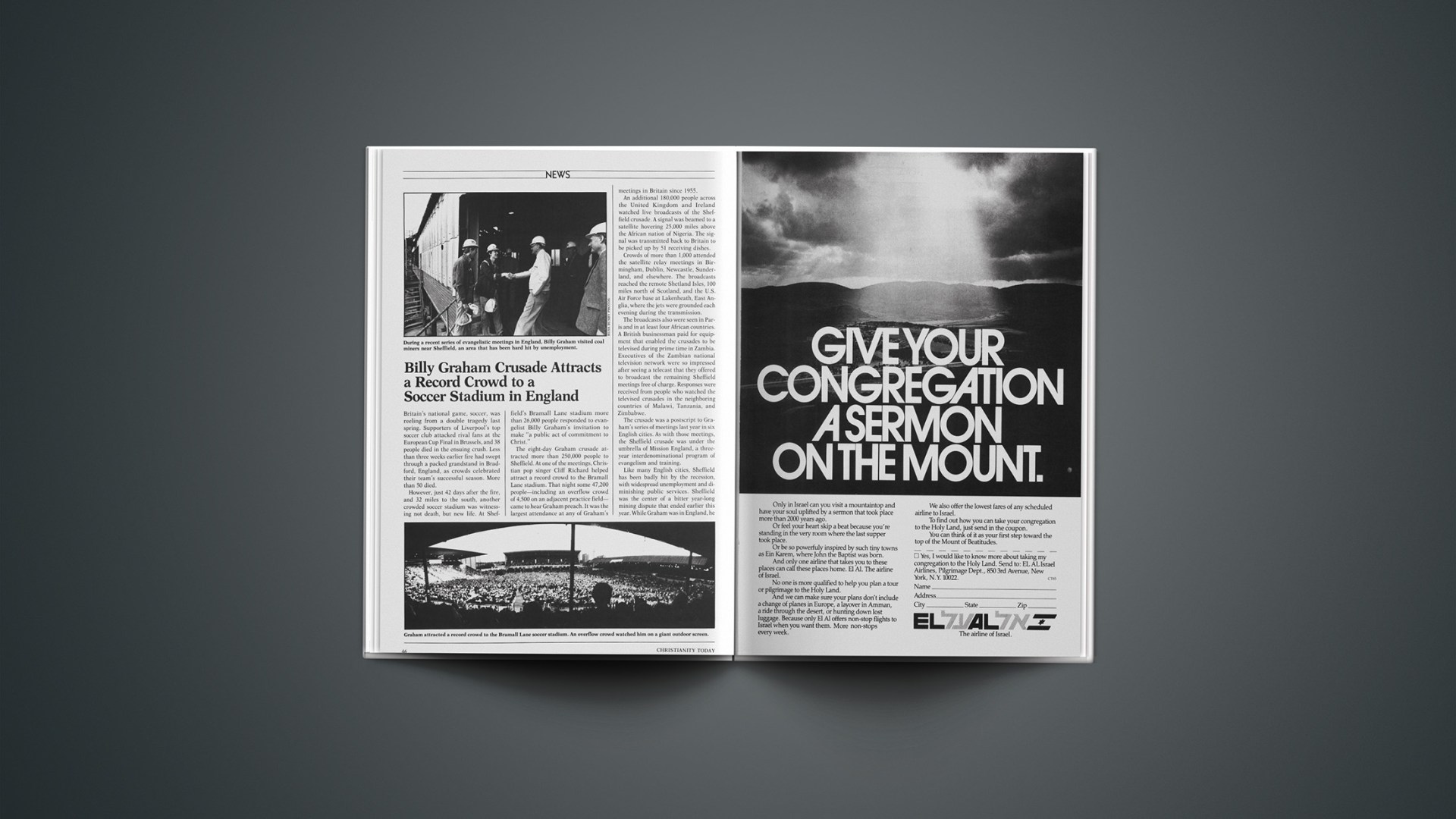Britain’s national game, soccer, was reeling from a double tragedy last spring. Supporters of Liverpool’s top soccer club attacked rival fans at the European Cup Final in Brussels, and 38 people died in the ensuing crush. Less than three weeks earlier fire had swept through a packed grandstand in Bradford, England, as crowds celebrated their team’s successful season. More than 50 died.
However, just 42 days after the fire, and 32 miles to the south, another crowded soccer stadium was witnessing not death, but new life. At Sheffield’s Bramall Lane stadium more than 26,000 people responded to evangelist Billy Graham’s invitation to make “a public act of commitment to Christ.”
The eight-day Graham crusade attracted more than 250,000 people to Sheffield. At one of the meetings, Christian pop singer Cliff Richard helped attract a record crowd to the Bramall Lane stadium. That night some 47,200 people—including an overflow crowd of 4,500 on an adjacent practice field—came to hear Graham preach. It was the largest attendance at any of Graham’s meetings in Britain since 1955.
An additional 180,000 people across the United Kingdom and Ireland watched live broadcasts of the Sheffield crusade. A signal was beamed to a satellite hovering 25,000 miles above the African nation of Nigeria. The signal was transmitted back to Britain to be picked up by 51 receiving dishes.
Crowds of more than 1,000 attended the satellite relay meetings in Birmingham, Dublin, Newcastle, Sunderland, and elsewhere. The broadcasts reached the remote Shetland Isles, 100 miles north of Scotland, and the U.S. Air Force base at Lakenheath, East Anglia, where the jets were grounded each evening during the transmission.
The broadcasts also were seen in Paris and in at least four African countries. A British businessman paid for equipment that enabled the crusades to be televised during prime time in Zambia. Executives of the Zambian national television network were so impressed after seeing a telecast that they offered to broadcast the remaining Sheffield meetings free of charge. Responses were received from people who watched the televised crusades in the neighboring countries of Malawi, Tanzania, and Zimbabwe.
The crusade was a postscript to Graham’s series of meetings last year in six English cities. As with those meetings, the Sheffield crusade was under the umbrella of Mission England, a three-year interdenominational program of evangelism and training.
Like many English cities, Sheffield has been badly hit by the recession, with widespread unemployment and diminishing public services. Sheffield was the center of a bitter year-long mining dispute that ended earlier this year. While Graham was in England, he met with miners union leader Arthur Scargill. “I talked to him about what I believe Christ can do in the present situation,” Graham said of the meeting. The evangelist also met with miners at a nearby coal mine.
More than 1,200 churches in Sheffield and South Yorkshire supported the crusade, taking their lead from the city’s Anglican bishop, David Lunn. Thousands of church members were trained as counselors and nurture group leaders. Tens of thousands covenanted to pray with two others for the salvation of nine friends or relatives.
The few religious leaders who were critical of Graham during his British crusades last summer were silent during the Sheffield meetings. The only public note of dissent this year came from David Pawson, a leader in the charismatic renewal movement. Pawson said he had a vision that Graham’s meetings were no more than a dead-end siding off a main railroad track.
The meaning of that vision would likely be disputed by a miner’s wife in Sheffield. Last summer she was about to divorce her husband; her 13-year-old son was involved in crime; and her daughter was emotionally troubled. The woman committed her life to Christ at one of Graham’s meetings last year. She was able to salvage her marriage, and her husband and son became Christians.
On the first night of Graham’s Sheffield crusade this year, the woman’s daughter responded to the altar call. That same night, the mother herself was volunteering her services as a crusade counselor.










